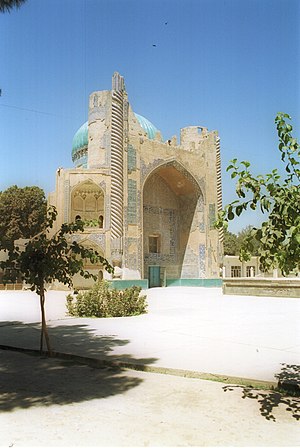
Mīrzā Muhammad Tāraghay bin Shāhrukh, better known as Ulugh Beg, was a Timurid sultan, as well as an astronomer and mathematician.

Shah Rukh was the ruler of the Timurid Empire between 1405 and 1447.
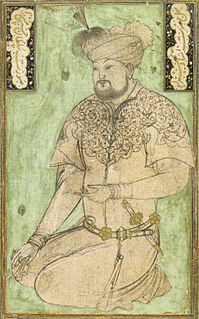
Sultan Husayn Bayqara Mirza was the Timurid ruler of Herat from 1469 until May 4, 1506, with a brief interruption in 1470.
‘Abdullah Mirza was a short-lived ruler of the Timurid Empire, which encompassed the territory shared by present-day Iran, Afghanistan, Pakistan, along with substantial areas of India, Mesopotamia and Caucasus.
Abdal-Latif Mirza was the great-grandson of Central Asian emperor Timur. He was the third son of Ulugh Beg, Timurid ruler of Transoxiana.
Sultan Muhammad was the Timurid ruler of Persia and Fars from around 1447 until his death. He was the son of Baysunghur son of Shah Rukh.
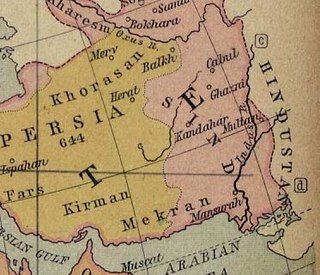
In 1504 Babur besieged Kabul and took the city from the Arghuns under Mukim Beg Arghun to become the new king of Kabul and Ghazni regions. The territory gave him respite from his Uzbek troubles in Central Asia and allowed him to build his nascent kingdom into a strong and formidable power in later years, enough to be able to conquer northern India.

Abu Sa'id Mirza was the ruler of the Timurid Empire during the mid-fifteenth century.
Abul-Qasim Babur Mirza, was a Timurid ruler in Khurasan (1449–1457). He was the son of Ghiyath-ud-din Baysunghur ibn Shah Rukh Mirza, and thus a great-grandson of Amir Timur.
Badi' al-Zaman Mirza was a Timurid ruler of Herat from 1506 to 1507. He was the son of Husayn Bayqarah, who was a great-great-grandson of Timur.
After the death of Shah Rukh, Gawhar Shad allowed Abdal-Latif Mirza to be the commander of his army despite reservations of the Tarkhans as well as the reservations of Baysunghur Mirza's sons, especially Abul-Qasim Babur Mirza who was present there at the camp. Gawhar Shad wanted to please Ulugh Beg but at the same time encouraged the Baysunghur brothers to rebel. She contacted Ala al-Dawla Mirza at Herat conveying her sentiments. Therefore, Abul-Qasim Babur Mirza along with Khalil Sultan, son of Muhammad Jahangir and a daughter of Shah Rukh along with their troops raided the Urdu Bazar or Camp Market and went on towards Ala al-Dawla Mirza at Herat. As soon as Abdal-Latif Mirza got his army in order after several executions he marched towards Damghan and on his way imprisoned Gawhar Shad his grandmother and the Tarkhans.
During the Second Timurid Succession Crisis, the sons of Baysunghur; Ala al-Dawla Mirza and Abul-Qasim Babur Mirza had acted in cognizance and blocked Abdal-Latif Mirza's chances of uniting with his father Ulugh Beg. Abul-Qasim Babur Mirza had taken Mazandaran and Jurjan whereas Ala al-Dawla Mirza had taken Mashad thereby surrounding Abdal-Latif Mirza at Nishapur. On April 20, 1447, Ala al-Dawla Mirza's army surprised and attacked the city of Nishapur. Abdal-Latif Mirza was defeated and imprisoned whereas, Gawhar Shad and the Tarkhans were freed. They then marched towards Sadabad, Nishapur where Ala al-Dawla Mirza met Gawhar Shad and together they marched with the army towards Herat. At Herat, Abdal-Latif Mirza was kept in the fort of Iktiyar-al-Din. The army of Khurasan now marched against Ulugh Beg towards Samarkand.

Abul-Qasim Babur Mirza, a Timurid ruler in Khorasan, invaded other parts of the region in the winter of 1448–1449 that were held by the Timurids of Samarkand, led by Ulugh Beg. Abdul-Qasim Babur Mirza was victorious and ruled over the area until his death in 1457.
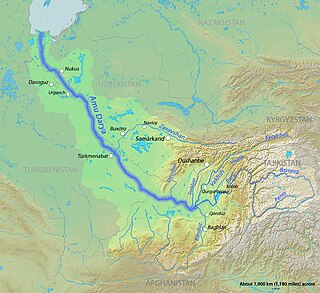
It is not clear what led Abdal-Latif Mirza to revolt against his father Ulugh Beg in 1449 C.E. Many theories abound; one being that he was raised by Gawhar Shad in Herat and not by his father Ulugh Beg who was governor of Samarkand during the reign of Shah Rukh, therefore Abdal-Latif Mirza was not attached to his father. Ulugh Beg on the other hand preferred his second son Abdal-Aziz Mirza to be his heir, whom he had raised himself and groomed to take over. Another reason was that when the Baysonqor brothers invaded Khurasan, Ulugh Beg left his son Abdal-Latif Mirza, to deal with a difficult situation making it look as if it were his failures that led to the loss of Khurasan; this Abdal-Latif Mirza resented deeply. And finally, during a revolt in Balkh in Spring of 1449 by a certain Miranshah, which was crushed by Abdal-Latif Mirza, was discovered a letter from Ulugh Beg to this Miranshah ordering him to instigate the revolt. This story is not corroborated by any other source than Mirkhond but is given as a last excuse for all out war with his father. The real reason of this revolt may never be fully understood but Abdal-Latif Mirza marched in haste towards Samarkand after abolishing the state taxes on trade through Balkh and taking over the river boats on Amu Darya.

While Abul-Qasim Babur Mirza was away from Herat crushing the revolt of Amir Hendugha in Asterabad, Ala al-Dawla Mirza, his older brother, managed to escape from prison in Herat and went straight to his youngest brother Sultan Muhammad Mirza's province of Fars seeking his protection. Sultan Muhammad Mirza and Ala al-Dawla Mirza then marched with a large army and invaded Khurasan in 1449. This was the same time as the revolt of Abdal-Latif Mirza in Balkh against his father Ulugh Beg at Samarkand. While the father and son were busy facing off at the Amu Darya in the north, the Baysonqor brothers were about to engage in battle in Khurasan. Abul-Qasim Babur Mirza marched to face his brothers in battle and the two armies met at Farhadgerd. Sultan Muhammad Mirza and Ala al-Dawla Mirza defeated Abul-Qasim Babur Mirza who fled to the castle of Omad. Sultan Muhammad Mirza entered Herat and freed Ibrahim Mirza son of Ala al-Dawla Mirza. Abdal-Latif Mirza, who before the battle had sent an envoy to Abul-Qasim Babur Mirza professing peace during his revolt against his father Ulugh Beg, now congratulated Sultan Muhammad Mirza in taking Herat. But Sultan Muhammad Mirza was saddened by Ulugh Beg's defeat at Dimishq and his murder en route to Makkah by his son; however, he decided not to pursue a war in Transoxiana and instead wanted to concentrate on his holdings in Iraq-i-Ajam, Fars and now Khurasan as well.
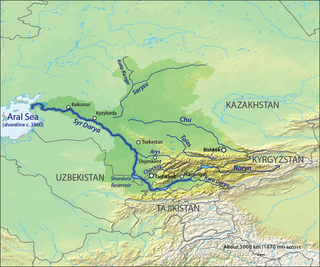
Abu Sa'id Mirza occupied Herat on July 19, 1457. But he had to immediately abandon the city in order to deal with the Balkh revolt by the sons of Abdal-Latif Mirza, one of whom he killed in battle while the other Juki Mirza escaped to the steppes in the north under the protection of Abul-Khayr Khan, the Khan of the Uzbek principality of Tura, a part of the empire of Desht-i Kipchak region that lies to the east of Ural mountains.
Sultan Mahmud Mirza was a prince of Timurid branch of Transoxiana, son of Abu Sa'id Mirza.
Rukn-ud-din Ala al-Dawla Mirza, also spelt Ala ud-Dawla and Ala ud-Daula, was a Timurid prince and a grandson of the Central Asian ruler Shah Rukh. Following his grandfather's death, Ala al-Dawla became embroiled in the ensuing succession struggle. Though he initially possessed a strategic advantage, he was eventually overtaken by his more successful rivals. Ala al-Dawla died in exile after numerous failed attempts to gain the throne.
Muhammad Juki Mirza was a Timurid prince and a son of the Central Asian ruler Shah Rukh. He served as one of his father's military commanders and may have been favoured as his preferred successor. However, he died of illness in 1445, predeceasing Shah Rukh by two years.
Imad al-Din Mahmud Junabadi was an Iranian bureaucrat, who served as a financial officer and vizier under the Timurid Empire. The son of Sayyid Zayn al-Abidin Junabadi, he belonged to a sayyid family from the town of Junabad in Quhistan, where they also owned land.
